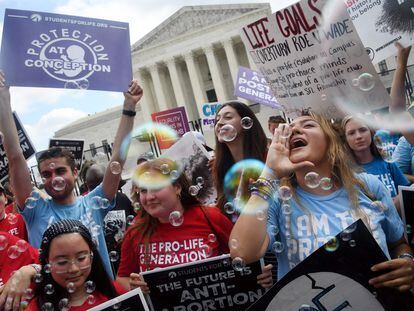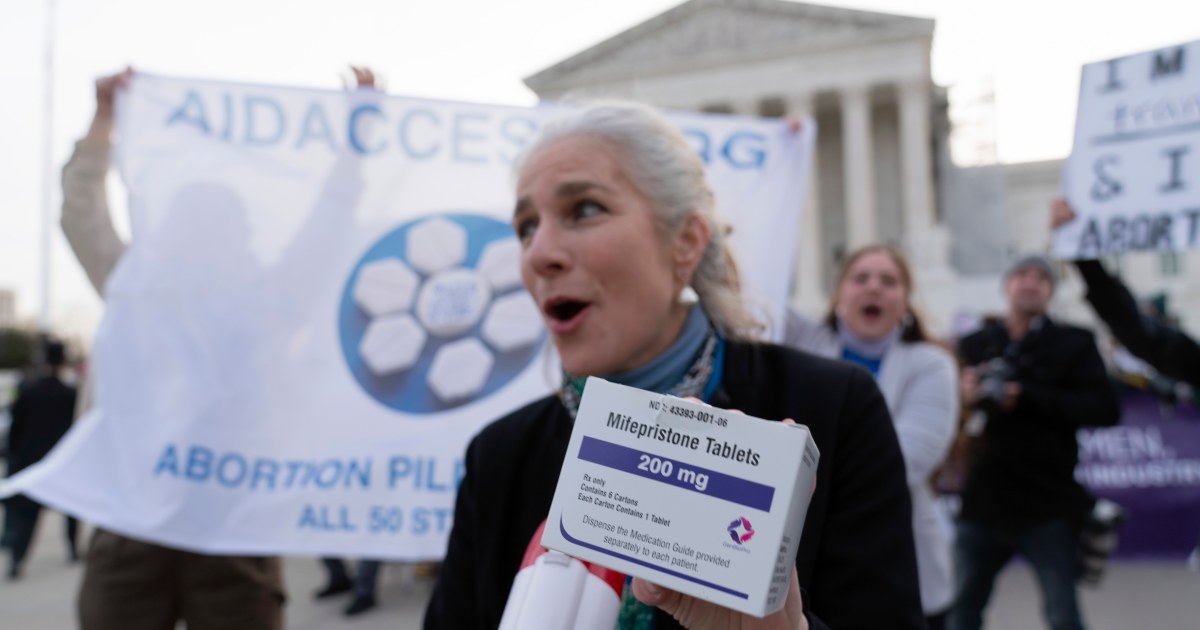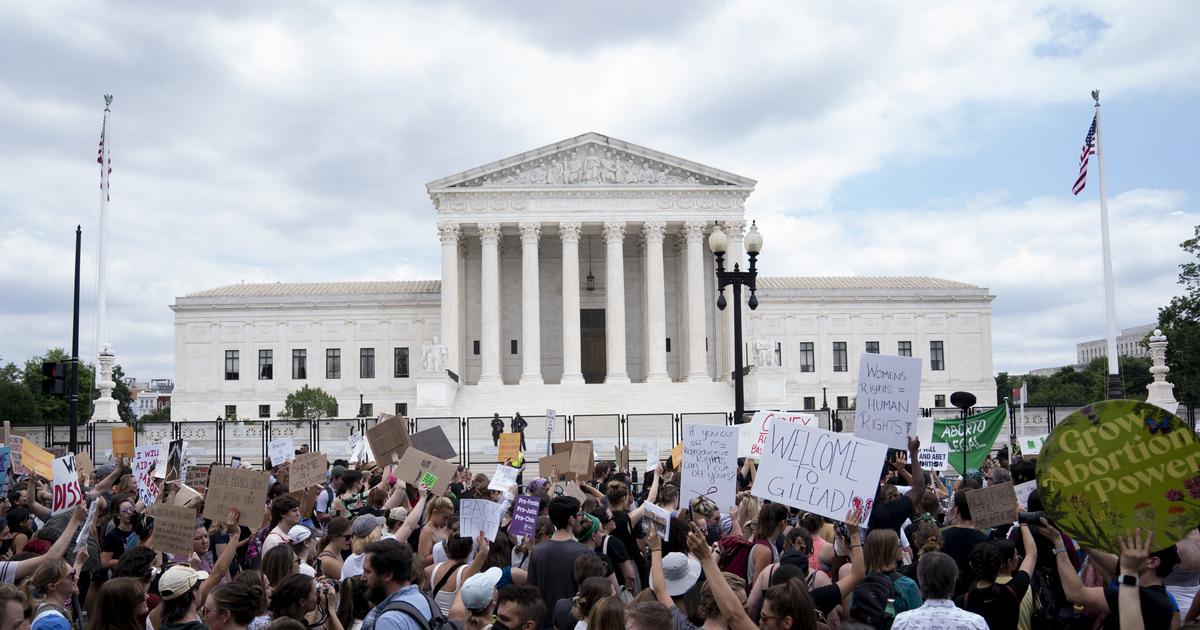The Supreme Court of the United States has annulled this Friday the federal right to abortion when ruling on a particular case, in the same way that half a century ago it enshrined it in its ruling on another lawsuit:
Roe v. Wade,
of 1973, which set the legal precedent that since this Friday is already dead paper.
The case that has just entered with capital letters in the judicial and social history of the United States bears the name
Dobbs v. Jackson Women's Health Organization.
She was up against Mississippi authorities with a reproductive health clinic in her capital over a 2018 state law that bans most terminations after the first 15 weeks of pregnancy.
Six conservative judges (against three liberals) have ruled that abortion is not protected by the Constitution and have returned to the 50 States the power to legislate on the subject.
It is estimated that 26 States will rush to prohibit the legal and safe termination of pregnancy to a greater or lesser extent.
In other places, of a democratic sign, they will promulgate norms that guarantee it beyond the sentences of the Supreme Court.
The ruling has unleashed a real political and social earthquake in the United States, even though the fund was already known since last May, when a draft, written by Samuel Alito, author of the majority opinion, was leaked.
Essentially it has remained intact, despite the fact that it was written in February and despite social pressure.
In its 213 pages, that majority opinion (seconded by Clarence Thomas, Neil Gorsuch, Brett Kavanaugh, Amy Coney Barrett and the president, John Roberts) is followed by the concurring individual opinions of Thomas, Kavanaugh and Roberts, and, finally, the vote particular against the three liberal justices: Elena Kagan, Stephen Breyer and Sonia Sotomayor.
1. The majority opinion, signed by Samuel Alito
"The Constitution makes no reference to abortion."
Judge Samuel Alito, author of the court's majority opinion, begins his 79-page brief with the same idea with which he ends it: abortion is a "deep moral issue" that raises "opposing views."
“Some fervently believe that the human person exists from the moment of conception and that abortion ends an innocent life,” he notes.
“Others believe just as strongly that any regulation of abortion encroaches on a woman's right to control her own body and prevents women from achieving full equality.
Others, in a third group, think that abortion should be legal in some circumstances, but not in all”.
"During the first 185 years since the adaptation of the Constitution, each State was allowed to manage this matter in accordance with the vision of its citizens."
Roe v. Wade
: "Although the Constitution makes no reference to abortion, the Court held that it does confer a broad right to obtain it."
"Roe v. Wade
was horribly wrong from the start."
Alito attacks the 1973 sentence in a tone that received criticism for its harshness when a draft of the sentence known this Friday was leaked last May.
“Your reasoning for him was exceptionally weak and the decision has had damaging consequences.
And far from achieving a national agreement on the issue of abortion,
Roe
and
Casey
[Planned Parenthood v. Casey,
a case that in 1992 was on the verge of being carried forward by
Roe
, but ended up ratifying it] have inflamed the debate and deepened the divisions”, writes the conservative judge.
"It is time to abide by the Constitution and return the issue of abortion to the representatives of the people," he stresses.
That is, to the legislative chambers of each state.
Abortion is not a right “implicit in the concept of freedom”.
The judge recalls that both the
Roe
precedent (1973) and its ratification in the Casey case (1992) are based on the 14th Amendment to the Constitution.
This serves to guarantee some rights that are not explicitly mentioned in the Magna Carta of the United States but are "deeply rooted in history and tradition" or are "implicit in the concept of required freedom", as established in the
Washington v. Glucksberg
ruling , of 1997. "The right to abortion does not fall into this category," says Samuel Alito.
“Americans continue to hold passionate and widely divergent views on abortion,
and state legislatures have acted accordingly.”
Here, Alito forgets the statistic: according to a recent study by the Pew Research Center, 61% of Americans believe that abortion should be legal in all or almost all circumstances, although many are open to restrictions, while 37% think it should be illegal.
2. The concurring opinion of Judge Clarence Thomas
"We have a duty to correct other precedents."
Justice Clarence Thomas, perhaps the most conservative of the most conservative court in decades, joins "the [majority] opinion of the court because he correctly holds that there is no constitutional right to abortion."
But he doesn't seem like enough.
Roe v. Wade
is based on the Fourteenth Amendment, which guarantees the right to privacy.
Other rulings are based on that same amendment that, according to experts, are in the wings, such as the one that guarantees homosexual marriage
(Obergefell v. Hodges
, 2015), relationships between people of the same sex
(Lawrence v. Texas,
2003) and the contraception
(Griswold v. Connecticut
, 1965).
Thomas asks the court to consider overturning those precedents as well.
3. The concurring opinion of Brett Kavanaugh
“Nothing in this opinion should imply that non-abortion precedents are called into question.”
Brett Kavanaugh, one of the three judges appointed by Donald Trump, writes in a text added to the majority opinion that this does not mean that other rights, such as gay marriage or same-sex relationships, are in question.
"I emphasize what the court is saying today: Overturning
Roe
does not mean overturning those precedents, and it does not threaten or call into question those precedents."
More information
Photo gallery: Protests and reactions after the decision of the right to abortion in the United States
4. The concurring opinion of Chief Justice John Roberts
"I would have taken a more measured path."
One of the great unknowns about this decision was what position the president of the court would adopt.
In the leaked draft he was not listed as a signer of the majority opinion.
He finally he has voted in that sense, although with reservations.
He would have stayed behind in endorsing the Mississippi law that was in question, but he didn't think it necessary to go as far as knocking down
Roe
.
“Let me begin with my agreement with the court, on the only question we need to decide here: whether we should keep the
Roe
and
Casey rule
that a woman's right to terminate her pregnancy extends to the point where the fetus is considered 'viable' outside the womb.
I agree that this rule should be dropped."
That is the limit that he would have touched, without repealing the federal right to abortion.
5. The individual opinion of the three liberal judges
"A woman will have to give birth to her rapist's son or her father's daughter, regardless of whether doing so destroys her life."
A "catastrophic" sentence that "takes away the freedom" of women.
This is how it is defined by the private opinion signed by judges Breyer, Sotomayor and Kagan, who emphasize that the sentence goes beyond admitting the Mississippi law that prohibits abortions after the fifteenth week of pregnancy.
“According to the majority ruling, the law of another State could do it after 10 weeks, or five, or three, or one, or, again, from the moment of fertilization,” they write.
The dissenting judges recall that the States have already approved laws of this type, anticipating the sentence.
“Others will follow.
Some states have enacted laws that extend to all forms of abortion procedures, including taking medication at home.
They have passed laws without any exceptions for when the woman is the victim of rape or incest.
Under those laws, a woman will have to give birth to her rapist's son or her father's daughter, regardless of whether doing so destroys her life.”
"Perhaps, as a result of today's decision, a state law will also criminalize the conduct of the woman, imprisoning or fining her."
In their private opinion, they also point out that after the sentence, some States can force women to carry a fetus with serious physical anomalies to term, even if it will die shortly after birth.
"States can even argue that a ban on abortion does not have to protect women from the risk of death or physical harm," they say.
“The application of all these draconian restrictions will also be left largely in the hands of the States”, they say in relation to the consequences of an abortion that becomes illegal.
They point out that, with this ruling, States can impose long prison sentences on those who perform abortions.
“But some states will not stop at it.
Perhaps, as a result of today's decision, a state law will also criminalize the conduct of women,
“It is the women who cannot afford it who will suffer the most.”
Twice progressive judges insist that the law is especially harmful to the poorest women.
“In states that ban abortion, women of means will still be able to travel to get the services they need.
It is the women who cannot afford it who will suffer the most”, says the dissenting opinion in one passage.
And in another: “Some women, especially those of means, will find ways to avoid the assertion of state power.
Others (those without money, childcare, or the ability to take time off work) won't be so lucky.
They may try an unsafe abortion method and be physically harmed or even killed.
They may continue the pregnancy and have a child, but at significant personal or family cost.
At a minimum, they will come at the cost of losing control of their lives.”
“It forces [a woman] to comply with the will of the State,”
warn the three liberal judges, “regardless of the circumstances and the damage caused to her and her family.
Under the terms of the Fourteenth Amendment, she takes away his liberty.”


/cloudfront-eu-central-1.images.arcpublishing.com/prisa/3F3EHAP7NYDCD7NIOIZLOQJFPI.jpg)






